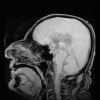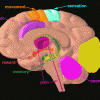Thanks a lot for for the reply, Noopmed
I'm already mild bipolar 2, hence the hypomania (manifesting as something similar to ADHD while studying). Do you think all bipolar tendency people could be strong responders (more active glutamatergic system?)
So the bellshaped dose response curve of piracetam wouldnt apply to me, does it?
Stablemind user had told me that its safe to try Pramiracetam with its HACU activity, and try and avoid other racetams which have glutamatergic activity. What do you think about that?
1.) I've never read any studies looking specifically at the effects of racetams on bipolar participants, but I can try to speculate a bit... I don't believe bipolar disorder has been characterized as specifically having a more active baseline glutamatergic system, but instead having shifting phases of increased and decreased brain activity. I've always thought of bipolar disorder as kind of like a seizure...since some of the most effective treatments for bipolar disorder are actually seizure medications... ie. Valproate, Keppra, Tegratol, Topramax, etc... In a seizure, there are focal points in the brain where signaling becomes unregulated and there is dyssynchronous firing that can potentially spread from that focal point over the entire brain into a generalized seizure, what we see is inappropriate muscle activity and sometimes the person has strange sensory experiences, etc. In bipolar disorder something like this is happening, but it appears to be involving the emotional and motivational centers of the brain. This analogy is not very good because there's probably MUCH more actually going on, but the point I'm trying to make is that the medications that seem to work well for treating bipolar disorder do so by selectively changing channel activity and changing the way neurons behave and respond to eachother. Keppra (AKA LevetiRACETAM) is one of the fastest growing drugs to treat both seizures and bipolar disorder. It is a derivative of Piracetam. Like Piracetam, it appears to increase the seizure threshold in patients, however; Levetiracetam does this much better than Piracetam and does not appear to have the cognition and memory enhancing effects-- in fact it appears to slow corpus collosal transmission (communication between the two halves of the brain). Long story short, any racetam supplement will probably interact with Bipolar disorder in a unique way-- possibly improving the symptoms or potentially interfering with or changing the effects of medication already established and stable in the patient's treatment. I don't think all people with bipolar disorder will be "strong responders" to Piracetam all the time, but I think that as their psychological disposition shifts and changes as can be expected of this disorder, their responsiveness to the Piracetam will shift as well. It might actually alleviate some of the symptoms of the depressive phase, but probably not help cognition much, and then increase the symptoms of the manic phase, or maybe even reduce them, who knows...that's kinda the way all the psych meds work-- much the same as Nootropics in general-- the Nootropics user must experiment (the Psychiatrist must try different medications with their patient), until an ideal balance is found that works in an individualized way for the user. Either way, I would be very cautious if you're taking any kind of medication with a similar mechanism of action to a Racetam to control your bipolar disorder. I have no idea how Lithium would be effected if you're using that, but if you're using a drug that is also indicated for seizures like the ones I mentioned above-- be aware that there could be some significant drug interactions taking place-- for example, increased or decreased effectiveness of your current medications. So tread lightly and be aware that racetam use could off-balance your current disposition with Bipolar Disorder (this goes for Seizure disorders as well).
2.) As far as a Bell-Shaped curve-- I doubt this would significantly change for you-- the efficacy curve for Racetams should still be the same shape, the difference would be what doses apply to the curve (ie. the whole thing may be populated with an average dose that is lower than it is for most people, for example every dose along the curve multiplied by 80%, for example, though only the user can really judge specifically).
3.) As for Pramiracetam-- it does have some indicated HACU activity, based on a lone study that is very old. I would like to believe that study, but I would like it more if there had been some replications of it. Either way, Pramiracetam ALSO has most of the same mechanisms of action as Piracetam based on the research that is available. It is more potent (lower dose needed), but appears to have similar efficacy (similar effect) to Piracetam on NMDA channel modulation, learning, memory, etc. So, it also still has significant glutamatergic activity. The added "bonus" of increasing HACU activity should facilitate the efficient firing of acetylcholine neurons bundled along with glutamatergic neurons-- which appears to be one of the primary ways by which the racetams improve cognition. HACU is very important, but unfortunately poorly researched at this point. ALSO, back to Bipolar, if you are taking Lithium for management, it might not be wise to use Pramiracetam. Pramiracetam has been known to increase nNOS (neuronal nitrous oxide synthase) which could potentially have deleterious effects at high levels. The combination of Lithium AND Pramiracetam has been shown to increase nNOS even more-- up to 40% of baseline.
http://www.ncbi.nlm..../pubmed/8557218 As an aside, I recently learned that Sulbutiamine increases HACU by about 10%.
http://www.ncbi.nlm..../pubmed/4059305
Edited by NoopMed, 24 August 2013 - 03:41 PM.
















































